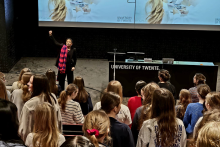The yearly FFNT meeting is traditionally a moment to reflect on the situation of female academics in the Netherlands and at the University of Twente. The network’s chairwoman Vanessa Magnanimo presented the results of the monitor by Dutch Network of Women Professors (LNVH). ‘The monitor showed that there are now 25,7 % of female professors at Dutch universities. That is 1.5% higher than last year, which is good news.’
‘However, at this rate we will only reach 30% in 2024 and 50% representation in 2041,’ continued Magnanimo. ‘The only possibility to make this faster is to learn from the past, which shows that we need structural measures to support women. We need that push. We need more than what we have now. The University of Twente now has about 21% of female professors. The technical universities are, as usual, in the lowest positions.’
Initiatives announced
Several new measures and initiatives were introduced during the FFNT event this morning. Such as:
- The UT is preparing to launch a new round of Hypatia chairs, academic positions available only to women.
- Based on input from its 300+ members, FFNT is preparing its new official strategy for 2025. The strategy, including a set of actions, should be published this year.
- Targets for the percentage of female scientist have been defined for each UT faculty and academic level. These target should contribute to a more homogenous growth of female representation at the university. Overall, the UT aims for 25% of female professors by 2025.
Clear criteria
Several participants suggested that the UT should have clear rules on how to get promoted. ‘When it comes to promotion to associate or full professor, it’s not clear what the criteria there are,’ voiced ITC researcher Roshanak Darvishzadeh, a member of the LNVH Sounding Board. ‘The criteria can very a lot within the university. There needs to be a clear set of rules. That is something that can be pushed within our university.’
‘This is indeed a known topic,’ responded Magnanimo. ‘I personally think that there should be a compromise between strict criteria and a flexible career path – that is why we have the Recognition & Rewards movement. We should find the balance between the clarity and flexibility of the criteria.’
Women only?
The online debate then turned to the question of whether FFNT should only focus on ‘females’ in academia. ‘There has been a lot of discussion whether this should indeed still be the focus of FFNT or whether we should focus on diversity in a broader context,’ commented Vanessa Magnanimo.
‘Fifteen years ago, when FFNT started, there was only 6% of female professors at the UT. Of course things have changed a lot in last years and there is now fortunately a broader interest in diversity. We considered if FFNT should change name and focus on diversity in a broader context, but we concluded that we still need to focus on academic career of women. They are still not equally represented,’ said the chairwoman. ‘There are other initiatives at the UT that focus on the broader context. Our mission stays focused on women.’







